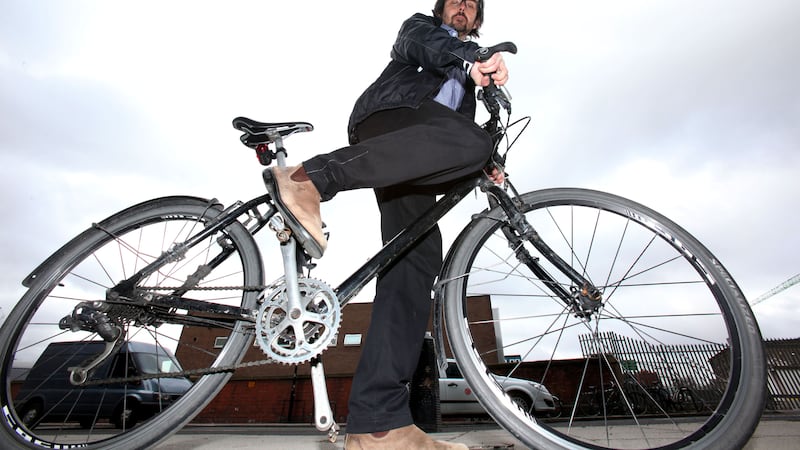Peter Walker knows the title of his book is misleading. How Cycling Can Save the World sounds like environmentalist idealism or Luddite dogma, which are exactly the attitudes toward cycling the London-based journalist sees as a problem.
Walker's new book argues that "mass cycling" is a deeply pragmatic solution to the problems of booming urban population. It could lead to decreased traffic congestion, safer roads, and people who are happier and healthier from getting exercise instead of sitting in traffic, he says, citing city-planning case studies and public health data.
As Walker points out in his book, Portland has been promoting mass cycling for a while. Still, only about 7 percent of Portlanders commute by bike. Compared to Europe, where, in some cities, more than 20 percent of all trips are taken by bike—Portland is lagging.
We talked to Walker about what Portland can do to improve that percentage, and the benefits of a more populist bike culture.
WW: Is it fair to say the title is hyperbolic?
I don't think the publisher would have gone with the title if it said, "How cycling can make the world more human, happy, welcoming and lots of other things." I think the benefits of getting lots of people on bikes are much more significant than many people think. So I don't think saying "saving the world" is overdoing it, really. It's saving the planet…from the problems that come from massively increased population and increased urbanization.
In Portland, we seem to have the infrastructure that would encourage mass cycling. But 7 percent of commuters traveling by bike is still pretty low. Why isn't it higher?
I know that Portland's been building bike lanes, but it needs a long period of very consistent action.… But the other thing is to make driving less convenient, which involves all sorts of things, like blocking off some residential roads. It will probably just take a little bit more time. In [Odense, Denmark], they have this astonishing figure—they claim that 81 percent of kids ride to school on their bikes. They say their network is sufficiently safe that any kid should be able to bike to school from the age of 6. Their mantra is, "It's not just about building the lanes, it's about telling people the benefits of [biking]." It's the sort of thing that can be replicated, it just takes a very coherent vision.
What's your stance on helmets?
There's an argument for saying [helmets are] almost less of a safety feature than a symptom of a system where no one can feel completely safe. It's this kind of debate that gets bogged down about what cyclists can do to protect themselves when [the] danger that does come from riding a bike is almost always external forces, like cars and trucks. If you have a properly coherent design that involves safe bike routes and tame traffic, then the need for helmets just kind of disappears. It does seem to be shown that forcing people to wear a helmet by law creates such an impression of cycling being this incredibly dangerous thing, it puts people off.
You talk about stereotypical hobbyist cyclists who tend to be more aggressive than the average rider. Are they actually hurting mass cycling culture?
Anyone on a bike instead of in a car is a good thing. However, they do perpetuate the idea that cycling is a kind of hobby, or a fixation or a lifestyle choice rather than just an ordinary thing. If you see people cycling dressed up as if they're going to work a shift in a nuclear power station or as if they're going to war, that can perpetuate the idea that cycling is more dangerous than it really is. You only get the real transformative changes when it's not so much that you get fewer people like that, but when you get more people for whom cycling is just an everyday thing.
You also say a barrier to seeing cycling as everyday is a culture of elitism in bike cultures, despite it being such a cheap way to get around. You mention an article in The Economist that referred to biking as "the new golf," which is pretty weird.
It is weird. It's something that changes the moment you have a more egalitarian bike share. Again, it's a symptom of the fact that the roads feel safer if you're able to go to reasonable speed to keep up with the traffic. So it encourages people who are already into sports cycling and might ride a road bike. Some advocacy groups are starting to think about how can we spread the message beyond the kind of middle-class, middle-aged men with opinions about gear.

Welcome to the 2017 Bike Issue
Portland Made Driving Miserable. All You Can Do Now is Bike.
What It Would Take For Portland To Become a Globally Elite Bike City?
A Selection of the Best New Cycling Gear
BikeTown isn't Just For Tourists. I Used It For a Week and It Was Great.
BikeTown Is Killing Portland Bike Shops
I Took An Epic E-Bike Ride from the Willamette Valley to the Coast
Is Portland's Proud Bike Culture Stunting the Adoption of E-Bikes?
